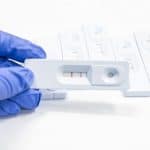Meth mouth is common among people who abuse methamphetamine (or crystal meth) for long periods. Someone suffering from methamphetamine addiction may have trouble avoiding this condition, which is a telltale sign that they need help.
Meth mouth may be treatable if you catch it early. If not, a considerable amount of dental work may be necessary to restore a healthy mouth.
Meth Mouth Signs & Symptoms
Meth mouth is severe tooth decay that results from long-term methamphetamine abuse. Teeth may be stained, blackened, rotting, crumbling, or falling apart.
Other meth mouth signs and symptoms include:
- missing teeth
- receding gum line
- jaw clenching or lockjaw
- dry mouth
- bad breath
Gum Disease
Methamphetamine use can lead to gum diseases—gingivitis or periodontitis (also called periodontal disease). Gingivitis is inflammation of the gums, while periodontitis is swollen, tender gums.
A large-scale study by the American Dental Association (ADA) found that 89 percent of males and 85 percent of females who used methamphetamine had periodontal disease. Of all participants:
- 96 percent had cavities
- 58 percent had untreated tooth decay
- 77 percent had lost at least one tooth
- 31 percent had six or more teeth missing
Poor oral hygiene is the cause of many of these dental problems. But meth use comes with unique risks that can make the problem worse.
What Causes Meth Mouth?
Methamphetamine is a highly addictive drug. If you have a meth addiction, you’re less likely to prioritize good dental hygiene, like regular brushing and flossing or dental checkups. The drug comes first.
Here are some other causes of meth mouth:
- Meth can give you cravings for high-calorie, sugary drinks and unhealthy foods that raise the risk of tooth decay, especially if you don’t brush often.
- Methamphetamine itself is an acidic substance that’s hard on the teeth and gums. It contains toxic chemicals like battery acid and paint thinner.
- A side effect of meth abuse is dry mouth (xerostomia), a condition in which your salivary glands don’t produce enough saliva to keep your mouth lubricated.
- Many people who use methamphetamine suffer from anxiety or nervousness. These issues can lead to teeth grinding or clenching, which isn’t good for dental health.
- Periodontitis—a common condition among people who abuse meth—causes the gums to shrink, making it harder for them to hold teeth in place.
People who have been addicted long enough and severely enough to develop meth mouth may be unwilling or unable to do anything about it. As a result, it likely gets worse.
Meth Mouth Treatment Options
Treatment for meth mouth depends on how bad you have it. A dentist can fill a few cavities and replace a missing tooth. But if you’re missing several teeth and your gums have deteriorated, you may need extensive (and expensive) dental work.
Meth mouth treatment options include:
- fillings for cavities
- dental implants (a false tooth and root)
- root canals (to repair an infected tooth from the inside)
- veneers (thin pieces to go over stained teeth and improve appearance)
- dentures (if you need a lot of new teeth)
- topical fluoride (to keep teeth strong and healthy)
The best care for meth mouth is prevention. Stop using methamphetamine to prevent further tooth decay and allow dental work to heal your mouth effectively.
Meth mouth isn’t the only negative effect of meth abuse. From skin sores to brain damage, methamphetamine can destroy your physical and mental health.
Meth Addiction Treatment
If you’re struggling with methamphetamine addiction, don’t wait until your teeth start falling out. Now is the time to ask for help.
Our compassionate treatment specialists at Northeast Addiction Treatment Center are always available to answer your questions about substance abuse and recovery. We want to help you find a treatment that fits your needs. Contact us today and take the first step toward a better life.
Sources
- BMC — Sympathomimetic effects of chronic methamphetamine abuse on oral health: a cross-sectional study
- Mouth Healthy — Meth Mouth: How Methamphetamine Use Affects Dental Health
- National Center for Biotechnology Information — Dental disease patterns in methamphetamine users: Findings in a large urban sample
- United States Department of Justice Archive — Meth Awareness
Written by
Northeast Addition Editorial Team
©2024 Northeast Addition Center | All Rights Reserved
This page does not provide medical advice.






